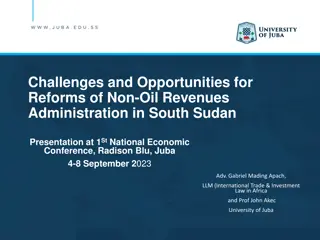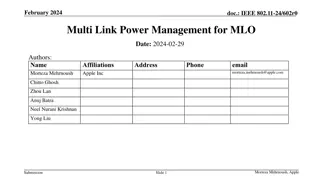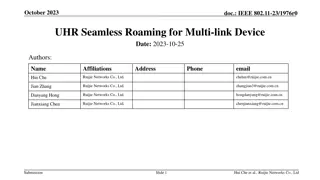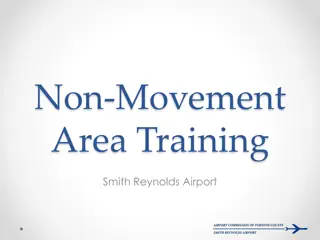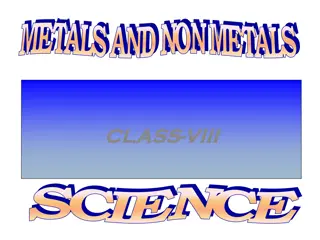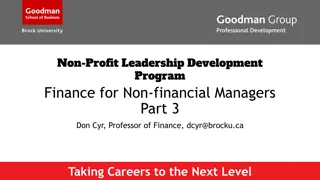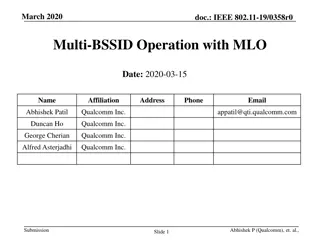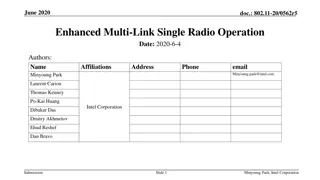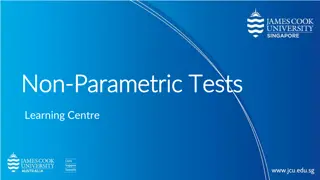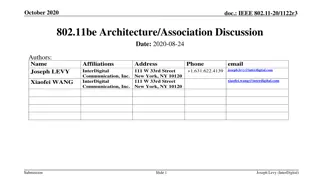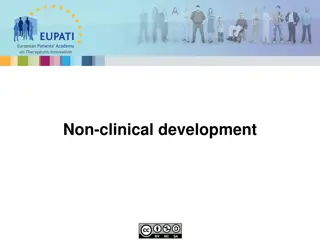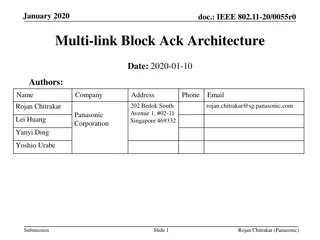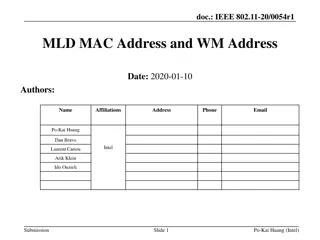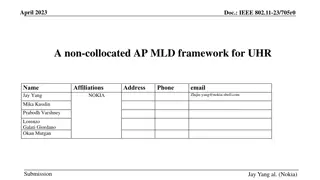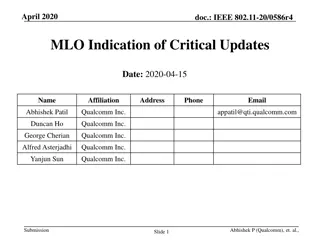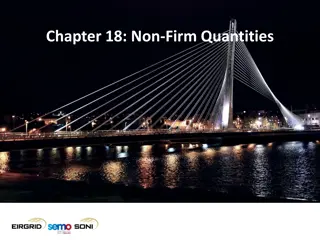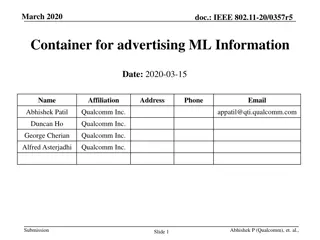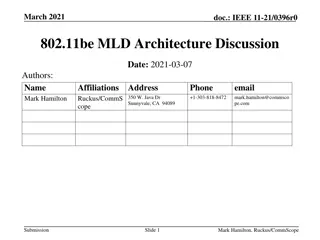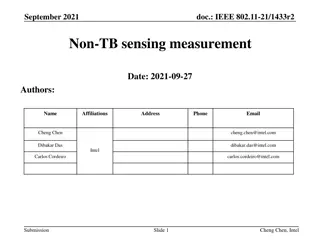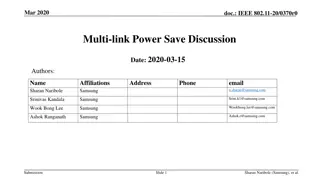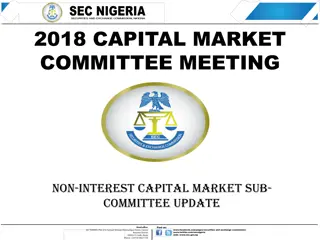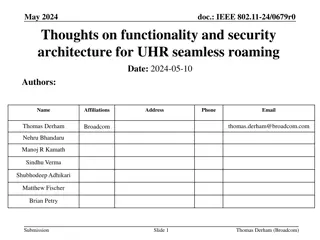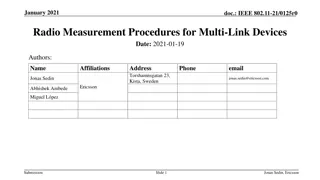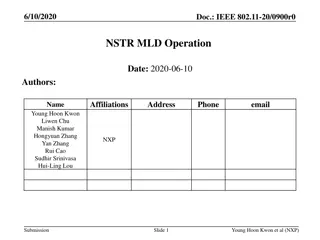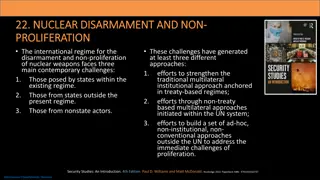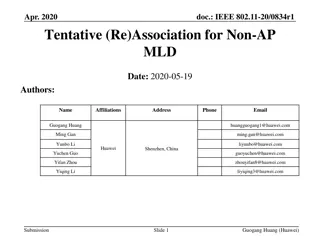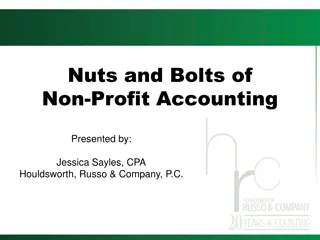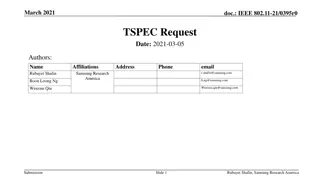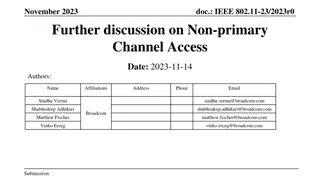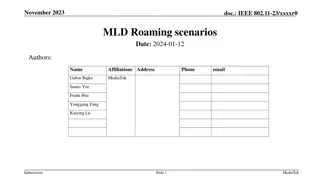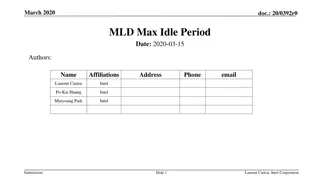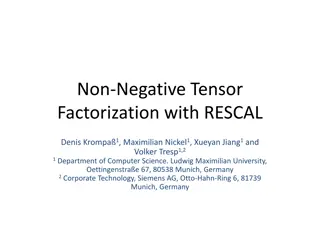Challenges and Opportunities for Reforms of Non-Oil Revenues Administration in South Sudan
The presentation highlights the reliance on oil revenues in South Sudan and the need for reforms in non-oil revenue administration. It discusses sources of non-oil revenue, factors hindering revenue mobilization, and opportunities for reforms to diversify the economy. The objectives of non-oil reven
3 views • 23 slides
Exploring Citizen Journalism and Non-Fiction Writing
Explore the world of citizen journalism and non-fiction writing, learning about text types, adapting writing to conventions, considering audience, purpose, and tone. Discover the significance and usefulness of non-fiction writing, and delve into creating various text types. Uncover the role of citiz
1 views • 11 slides
Improving Multi-Link Power Management Efficiency in IEEE 802.11 Networks
The document discusses challenges with per-link power mode changes in multi-link scenarios in IEEE 802.11 networks, proposing a solution for more efficient power management. It addresses issues such as latency and inefficiencies in signaling for power mode changes, introducing scheduled multi-link p
6 views • 9 slides
Seamless Roaming for Multi-link Device in IEEE 802.11-23
Seamless Roaming scheme for non-collocated AP MLD in IEEE 802.11-23 aims to enhance roaming efficiency by utilizing multi-link operation. It addresses issues of data interruption and time wastage during traditional roaming processes. The mechanism involves sharing PTKs among non-AP STAs and storing
1 views • 14 slides
Establishing Safety Standards in Non-Movement Areas at Smith Reynolds Airport
This guide outlines the purpose, definitions, rules, and safety measures for operating vehicles in non-movement areas at Smith Reynolds Airport. It emphasizes standardized ground movement practices to ensure the safety of airport patrons, reduce the risk of injury, and maintain a high level of safet
1 views • 12 slides
Understanding Metals, Non-Metals, and Their Properties in the Periodic Table
Classification of elements into metals, non-metals, and metalloids based on their properties is essential. Metals are known for their conductivity and malleability, while non-metals have contrasting features like brittleness and poor conductivity. This detailed overview explores the physical propert
0 views • 31 slides
Non-Profit Leadership Development: Finance Essentials for Managers
Explore the key concepts of finance for non-financial managers in the non-profit sector. Learn about cost benefit analysis, measures of project worthiness, and essential financial tools such as NPV, IRR, and ROI. Understand how to assess project risks and make informed financial decisions to enhance
1 views • 47 slides
Multi-BSSID Operation with MLO Overview and Signaling Considerations
The document discusses the integration of Multiple BSSID set feature and Multi-Link Operation (MLO) in IEEE 802.11 networks. It delves into the setup of virtual Access Points (APs) on the same device with distinct attributes, the formation of common parameters across APs within an MLD, and the signa
1 views • 13 slides
Overview of Energy Resources: Renewable and Non-Renewable
Energy resources are classified into renewable and non-renewable types, with a mix of both used worldwide. Non-renewable resources dominate global energy consumption, with fossil fuels like oil, natural gas, coal, and nuclear energy being major sources. While non-renewable sources still dominate, ef
1 views • 20 slides
Enhanced Multi-Link Single Radio Operation Proposal
The proposal discusses an enhanced mode of operation for single radio non-AP MLDs to enable multi-link operation, improving throughput and reducing latency. It addresses challenges in busy network environments, aiming to achieve low latency benefits similar to concurrent dual radio setups. The propo
0 views • 22 slides
Understanding Non-Aqueous Solvents: Types and Classification
Inorganic non-aqueous solvents play a crucial role in chemical research and industry. This article by Dr. Princy K.G. delves into the classification of solvents based on protonicity, polarity, and aqueous vs. non-aqueous nature. It explores the types of non-aqueous solvents, such as protonic and non
1 views • 29 slides
Understanding Non-Parametric Tests and Their Applications
Non-parametric tests serve as valuable alternatives to parametric tests when data do not meet specific criteria. This article explores the concept of non-parametric tests, types of non-parametric tests, and provides insights on conducting the Mann-Whitney U Test using SPSS for practical research app
4 views • 32 slides
Discussion on IEEE 802.11be MLD Architecture Alignment
IEEE 802.11 TGbe is exploring MLDs within the 802 architecture, focusing on aligning MLD operations with existing 802.11 features for enhanced compatibility. The MLD architecture aims to facilitate the flow of data between MAC SAPs and PHY SAPs, extending the current framework for APs and non-AP STA
1 views • 23 slides
Understanding Non-Clinical Development in Therapeutic Innovation
The European Patients Academy on Therapeutic Innovation focuses on the non-clinical development phase of medicine, delving into efficacy assessment, safety evaluation, and manufacturing process considerations. Non-clinical studies are essential for decision-making in clinical trials, marketing appli
1 views • 26 slides
IEEE 802.11-20/0055r0 Multi-link Block Ack Architecture Overview
This document from January 2020 presents an overview of the IEEE 802.11-20/0055r0 Multi-link Block Ack architecture proposed by Rojan Chitrakar from Panasonic. It discusses the negotiation of block ack agreements between multiple MLDs, common sequence number assignment, transmit and receive buffers,
1 views • 11 slides
Interactive GCSE Chemistry Lesson on Metals and Non-Metals
Engage in a dynamic one-hour lecture focusing on metals and non-metals in GCSE Chemistry. Discover the properties of metals and non-metals, understand the metallic bond, and explore the periodic table. Participate in tasks of varying difficulty levels, discuss statements related to metals and non-me
0 views • 17 slides
IEEE 802.11-21/1737r0 Beacon and Group Frames Information
An IEEE document from November 2021 discusses Beacon and group frames in wireless networks, focusing on out-of-band signaling to improve BSS range determination and frame reception by non-AP MLDs. It addresses the impact of frame types and MCS on BSS range and transmission rates, proposing solutions
3 views • 14 slides
IEEE 802.11-21/1737r0 Beacon and Group Frames Information
This document discusses the transmission of Beacon and group addressed frames in IEEE 802.11 networks, focusing on the impact of frame types and MCS on BSS range and transmission rate. It proposes out-of-band signaling to assist scanning STAs in determining BSS range and non-AP MLDs in selecting a l
0 views • 14 slides
IEEE 802.11-20/0054r1 MLD MAC Address and WM Address
In the document IEEE 802.11-20/0054r1, the focus is on Multi-Link Framework for MLD address identification and differentiation. It explains the usage of MLD MAC address and STA WM medium address in wireless setups. The document also addresses the need for identifying different MLDs using MAC address
0 views • 16 slides
Improving Latency Performance for Mobile Clients Using Non-Collocated AP MLD Framework
The UHR group aims to enhance latency performance for mobile clients by introducing a non-collocated AP MLD framework. This framework allows seamless transfer of client context between physical APs, improving roaming efficiency and supporting high numbers of links for non-AP MLDs. The proposed solut
3 views • 11 slides
IEEE 802.11-20/0586r4 MLO Indication of Critical Updates
The document discusses the need for a mechanism in the MLO framework to enable non-AP MLDs to receive updates to operational parameters without monitoring all links. It proposes that each AP of an MLD should provide an indication of updates to another AP's operational parameters. It also outlines ho
0 views • 17 slides
Understanding Non-Firm Quantities in Electricity Markets
Non-Firm Quantities in electricity markets involve units with non-firm access not being compensated for their non-firm capacity not getting accommodated on the system. The concept of Firm Access Quantity plays a key role in determining compensation levels for units, with differences in implementatio
0 views • 6 slides
Understanding Non-Compete Agreements: Enforceability and Requirements
Non-compete agreements are commonly used in the United States to protect businesses from competition by former employees. To be enforceable, these agreements must meet certain requirements, including independent consideration, protection of legitimate business interests, and reasonableness in scope,
0 views • 26 slides
Efficient Information Exchange for Wireless Networks
This document discusses the optimization of information exchange in IEEE 802.11 networks to reduce management frame overhead, improve power efficiency, and streamline the process of gathering and exchanging MLO information between APs and non-AP MLDs. The proposal suggests using beacon frames and di
3 views • 30 slides
IEEE 802.11be MLD Architecture Discussion
This presentation delves into architecture concepts for TGbe MLDs, focusing on AP and non-AP scenarios. It builds upon ideas from previous sessions, exploring topics such as RX/TX MSDU rate limiting, A-MSDU aggregation, packet integrity, and encryption. Implementation choices and legacy operation co
0 views • 15 slides
Comparison of Trigger-based vs. Non-Trigger-based Sensing Measurement in IEEE 802.11
The document discusses the differences between Trigger-based (TB) and Non-Trigger-based (Non-TB) sensing measurement instances in IEEE 802.11 standards, focusing on who initiates the sensing measurement. TB sensing is initiated by the AP, while Non-TB sensing is initiated by a non-AP STA, enabling o
6 views • 13 slides
IEEE 802.11-20/0370r0 Multi-link Power Save Discussion
The document discusses multi-link power saving in the IEEE 802.11be standard. It reviews extreme low power multi-link operation modes, emphasizing the importance of enabling a single link for practical power savings. The proposed extreme low power mode introduces fixed and dynamic anchor links for e
0 views • 11 slides
2018 Capital Market Committee Meeting Update on Non-Interest Capital Market Products and Developments
The 2018 Capital Market Committee meeting focused on utilizing Non-Interest Capital Market products like Sukuk for infrastructural financing, regulatory challenges hindering market growth, and promoting financial inclusion. Recent developments include CBN's Exposure Draft on National Financial Inclu
1 views • 6 slides
UHR Seamless Roaming: Functionality and Security Architecture Proposal
Discussion on the technical requirements for UHR seamless roaming, focusing on the non-AP MLD state preservation and data exchange context between AP MLDs. Proposing a security architecture based on FT to achieve seamless roaming while cautioning against sharing PTK(SA) across multiple AP MLDs. Emph
0 views • 34 slides
IEEE 802.11-21/0125r0 Radio Measurement Procedures for Multi-Link Devices
The IEEE 802.11 WLAN standard introduces the concept of Multi-Link Devices (MLD) in the 802.11be (EHT) amendment, enabling multiple affiliated STAs to work together. This document focuses on enhancing radio measurement procedures for MLDs to boost efficiency and flexibility in managing radio resourc
0 views • 14 slides
Enhancing Network Performance with NSTR MLD and SR/eSR MLDs
This document discusses the performance characteristics of Multi-Radio MLD (NSTR MLD) and Single-Radio/Enhanced Single-Radio MLDs (SR/eSR MLDs) in various operation scenarios. It highlights the strengths and weaknesses of NSTR MLDs and proposes ways to improve their operation efficiency. Additionall
0 views • 16 slides
Contemporary Challenges in Nuclear Disarmament and Non-Proliferation Regime
The international regime for nuclear disarmament and non-proliferation faces challenges from states within and outside the regime, as well as non-state actors. Various approaches are being utilized to address these challenges, including strengthening multilateral institutions, non-treaty-based multi
0 views • 12 slides
IEEE 802.11-20/0834r1: Recap of Association and Fast BSS Transition
The document presents insights into tentative (re)association for non-AP MLDs, focusing on addressing data delivery interruptions during roaming and association with new access points. It covers necessary actions before data transfer, open system authentication, association operations, and fast BSS
0 views • 17 slides
Improving Attainment and Progress of Disadvantaged Pupils in Sheffield
Attainment and progress of disadvantaged pupils in Sheffield show an improving trend across key stages, although the gaps between disadvantaged and non-disadvantaged students are not closing fast enough. Data suggests that disadvantaged pupils with low prior attainment are making better progress in
0 views • 29 slides
Understanding Non-Profit Accounting Essentials
Learn the basics of non-profit accounting, including what defines a non-profit organization, common types of non-profits, governance structures, and legal responsibilities. Discover key insights on IRS and state requirements for non-profits in this informative presentation by Jessica Sayles, CPA fro
0 views • 55 slides
Enhancing IEEE 802.11 for Traffic Information Exchange
Proposal to enable non-AP STAs or non-AP MLDs to request traffic information from APs or AP MLDs, aiming to improve traffic detection accuracy by providing essential details like timing information and traffic flow characteristics. The proposal introduces a new IE called TSPEC request to facilitate
0 views • 6 slides
Further Discussion on Non-primary Channel Access in IEEE 802.11
This contribution delves into the utilization of non-primary channels for access in IEEE 802.11 networks, focusing on enhancing frequency reuse, adhering to ETSI standards, evaluating CCA capability types, and analyzing non-ideal deployment scenarios. It discusses the complexity and benefits of non-
0 views • 26 slides
IEEE 802.11-23 MLD Roaming Scenarios
This contribution focuses on discussing MLD roaming scenarios to enable seamless roaming for non-AP MLD STAs, aiming to reduce packet loss and latency during roaming through methods like make before break. Various aspects of Intra V-MLD Roaming architecture are explored, including optimizing data pa
0 views • 17 slides
Proposal to Simplify MLD Max Idle Period for Non-AP MLDs
Proposal presented in March 2020.doc suggests defining the MLD Max Idle Period at the MLD level instead of the STA level for non-AP MLDs. The objective is to indicate to APs through keep-alive frames that the non-AP MLD is still active without needing to tear down multi-link setups. The proposal off
0 views • 4 slides
Non-Negative Tensor Factorization with RESCAL
This article discusses non-negative tensor factorization with RESCAL, covering topics such as Non-Negative Matrix Factorization, Multiplicative Updates, RESCAL for Relational Learning, and Non-Negative Constraint for RESCAL. It explores how factorizing matrices/tensors into non-negative factors can
0 views • 11 slides
